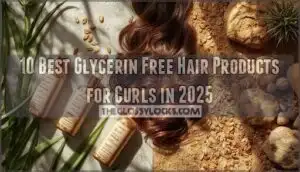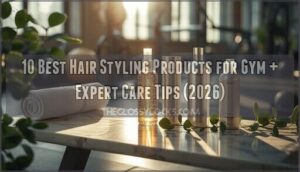This site is supported by our readers. We may earn a commission, at no cost to you, if you purchase through links.

The culprit behind this climate chaos is often glycerin, a moisture-hungry humectant that pulls water from wherever it can find it—which means from the air when it’s humid, creating frizz, or from your hair shaft when it’s dry, leaving your curls brittle and parched. These formulations offer curly and coily hair types the consistency they’ve been chasing, delivering definition and hold that won’t betray you the moment you step outside.
Table Of Contents
Key Takeaways
- Glycerin-free hair products replace glycerin with stabilizing alternatives like flax seed extract, aloe vera, and film-forming polymers that maintain a consistent moisture balance across all climates, eliminating the frizz you’d get in high humidity or brittleness in dry conditions.
- These formulations work by avoiding glycerin’s hygroscopic behavior—its tendency to pull water from either the atmosphere (causing frizz) or your hair shaft (causing dryness) depending on environmental conditions—making them particularly valuable for curly and coily hair types seeking predictable definition.
- The top glycerin-free products use alternative humectants and polymers to deliver hold and moisture retention without climate sensitivity, with options ranging from botanical gels with flaxseed and agave to protein-enhanced formulas with polyquaterniums that create protective barriers against humidity.
- Successful styling without glycerin requires matching product texture (gel, mousse, or cream) to your curl pattern and porosity, then layering lightweight moisturizers under film-forming products to maintain definition while preventing the moisture imbalance that triggers frizz in variable weather conditions.
What Are Glycerin Free Hair Products?
Glycerin-free hair products are formulations that exclude glycerin, a humectant known for drawing moisture from the surrounding environment into the hair shaft.
Instead of glycerin, these formulas use alternatives like aloe vera, panthenol, or flax seed extract.
They deliver the same moisture boost without the downside—glycerin pulls water from the air, which means frizz when it’s humid and brittleness when it’s dry.
Once you know what to look for—both the definition itself and the typical alternatives—you’ll spot whether a product is actually glycerin-free.
Definition and Key Characteristics
Glycerin-free hair products are formulations that exclude glycerol, a humectant sugar alcohol, and instead rely on alternative moisturizers and styling agents to condition, define, and hold curls without the humidity-sensitive drawbacks that glycerin can introduce.
You’ll recognize these products by their exclusion of glycerin, glycerol, or glycerine from the ingredient list—this polyol structure, while excellent at moisture retention in controlled environments, can pull water from your hair shaft in dry climates or absorb excess atmospheric moisture in humid conditions, disrupting curl definition in natural hair care routines.
Common Ingredients Used Instead of Glycerin
If you’re skipping glycerin, you’ll need other ingredients to lock in moisture and shape curls. Aloe vera extract, flaxseed gel, and hydrolyzed proteins pull water from the air without being as finicky about humidity levels.
For hold and definition, carbomers, polyquaterniums, and natural gums like xanthan or guar create the structure curls need to stay bouncy and defined.
Hyaluronic acid effectively draws moisture without the climate sensitivity associated with glycerin. Panthenol (pro-vitamin B5) strengthens hair strands and enhances elasticity.
In sulfate-free, natural hair products that prioritize ingredient transparency, coconut oil and shea butter deliver emollient conditioning, ensuring both nourishment and clarity in formulation.
Why Avoid Glycerin in Hair Care?
Glycerin works wonders for some curl patterns, but it can wreak havoc for others depending on your hair’s porosity, the climate you live in, and how your scalp reacts to humectants.
Knowing whether glycerin plays nice with your hair means you’ll pick products that actually work for you.
Let’s break down the three main reasons people choose glycerin-free formulations.
Effects of Glycerin on Curly and Natural Hair
Here’s the thing about humectant ingredients—they act differently depending on your climate, and that matters when you’re picking glycerin-based products.
Glycerin draws moisture into the hair shaft, boosting hydration and elasticity in curly hair while improving curl patterns and definition. However, in humid environments, this humectant can over-absorb moisture, causing excessive cuticle swelling and frizz. Conversely, dry climates reverse this effect—glycerin may pull moisture from your hair back into the air, compromising moisture balance and increasing brittleness.
These environmental reactions explain why many curlies seek glycerin-free hair products for consistent, climate-proof styling results. Understanding the humectant properties of glycerin is vital for making informed decisions about hair care products.
Glycerin and Humidity: Frizz and Moisture Issues
You’ll notice humidity’s impact most dramatically when the dew point climbs above 65°F—glycerin then becomes your curls’ worst enemy. This humectant pulls excessive atmospheric moisture into your hair shaft, causing cuticle swelling, structural weakness, and that dreaded frizz halo. Climate adaptation becomes critical for frizz control and moisture balance.
- High humidity environments: Glycerin concentrations above 5% in leave-in products trigger swelling and definition loss
- Dry or cold climates: The reverse problem occurs—glycerin extracts water from your hair, increasing brittleness
- Ideal performance zone: Dew points between 40°F and 60°F allow glycerin to function without compromising hair porosity or structure
That’s why glycerin-free hair products with film-forming polymers deliver excellent humidity control and frizz reduction across varied climates. Understanding humectants role is essential for managing curly hair in different environments.
Potential Sensitivities and Allergies
Glycerin has a reputation as a gentle, naturally-derived ingredient—but that doesn’t mean everyone’s scalp and skin will agree.
True allergic reactions are rare, yet irritation and contact dermatitis can still show up in people with sensitive skin.
Dermatological issues like redness, itching, or burning signal glycerin intolerance, particularly when concentrated formulations contact your scalp for extended periods.
Sensitivity testing through patch applications helps identify problematic humectants before committing to full product use, steering you toward glycerin-free hair products that deliver frizz control without skin irritation or glycerin side effects.
Who Should Use Glycerin Free Products?
Glycerin-free products won’t work miracles for everyone. But if your hair reacts badly to humidity, dryness, or certain ingredients, skipping glycerin might actually solve problems you’ve been battling for years.
Your hair type, local climate, and scalp sensitivity all play a role in whether ditching glycerin makes sense for your routine.
Here’s who actually sees real improvements when they cut out glycerin.
Curly, Coily, and Natural Hair Types
If you’re working with curly, coily, or natural hair, glycerin-free hair products might be your ticket to breakage-free, frizz-controlled styling. Here’s why curl pattern classification matters for your moisture balance tips:
- Type 3 and 4 hair textures feature S-shaped and Z-shaped patterns that make it tough for scalp oils to travel down each strand, leaving you prone to dryness.
- Over 70% of people with Type 4 hair struggle with routine dryness, while 63% report breakage from insufficient moisture—clear signs that traditional humectants don’t always work.
- Natural hair benefits from glycerin-free formulas during high humidity or low dew point periods, when standard products can pull moisture out or create unwanted frizz.
Your hair texture analysis reveals that coily hair care demands natural ingredients customized to your unique needs, not one-size-fits-all solutions.
People Living in Humid or Dry Climates
Your local climate isn’t just a weather report—it’s a daily chemical reaction happening on your hair shaft, and glycerin can either be your best friend or your worst styling enemy depending on where you live. In high humidity, glycerin pulls excess water into your strands, causing frizz prevention to fail. In dry climates, it strips moisture away, leaving you needing extra dry skin care. That’s why climate control matters for curly hair care—you need humidity management strategies that match your environment’s dew point.
| Climate Condition | Glycerin’s Effect | Glycerin Free Solution |
|---|---|---|
| High Humidity (>60%) | Absorbs excess moisture, creates frizz and swelling | Blocks unwanted water absorption, maintains definition |
| Low Humidity ( Glycerin promises universal results but gambles with your curls—turning them frizzy the moment humidity hits, forcing you to play a weather-dependent styling game you never signed up for |
Glycerin-free hair products finally hand you back control, swapping unpredictable humectants for stabilizing botanicals that deliver consistent definition whether you’re battling Gulf Coast humidity or Rocky Mountain dryness.
Your curl pattern doesn’t need to adapt to the weather anymore; your products should adapt to you.





